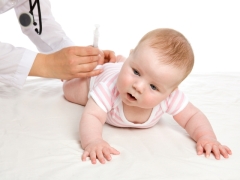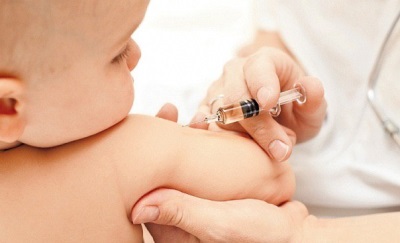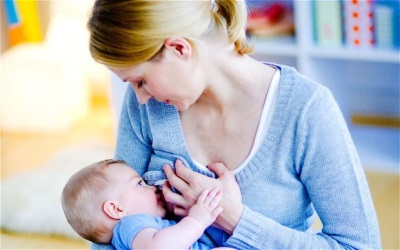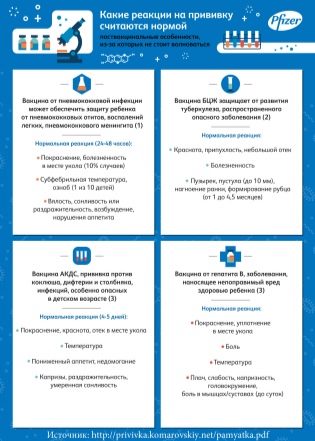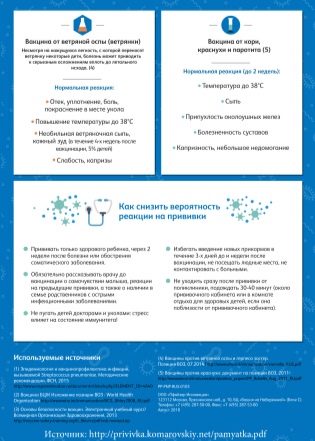Vaccination schedule for children up to one year in Russia
Vaccination of Russian babies starts from the first day after birth, so parents should know in advance about the vaccinations needed in the first year of life. Let's look at what mandatory vaccinations are present in the vaccination schedule of babies from birth to one year.
Why be vaccinated at such an early age?
Vaccination in the first year of life helps the formation of immunity in babies as early as possible, protecting them from dangerous diseases. The smaller the baby, the more dangerous the infectious disease is for it.
For example, if you are infected with whooping cough for up to 12 months, there is a huge risk of suffocation and brain damage.
In a baby with diphtheria, the airways are blocked with films, and tetanus often ends in death. Having become infected with hepatitis B, the child can remain a carrier of this virus for life. Tuberculosis in young infants is very dangerous transition in a common form and damage to the lining of the brain.
Of course, in the first months of life, the baby will most likely not encounter the causative agents of these dangerous diseases. However, this is precisely why vaccination is carried out in the first year. It is important that by the time the risks of infection increase (the child begins to actively explore the world and communicate with a large number of people), the baby already has protection from such infections.
Table
Child's age | What kind of infection is the vaccination against? |
First 24 hours | Hepatitis B |
From 3 to 7 day of life | Tuberculosis |
One month | Hepatitis B |
Two months | Hepatitis B (if the risks are elevated in a baby); Pneumococcal infection |
Three months | Hemophilic infection (babies who are at high risk of infection); Polio; Diphtheria; Tetanus; Whooping cough. |
Four and a half months | Polio; Pneumococcal infection; Tetanus; Whooping cough; Hemophilic infection (for children with an increased risk of infection); Diphtheria. |
Half a year | Polio; Whooping cough; Hepatitis B (except for children at risk); Hemophilic infection (for babies with an increased risk of infection); Diphtheria; Tetanus; Flu. |
12 months | Rubella; Hepatitis B (high-risk children); Parotitis; Measles. |
Short description
- The first vaccine used in babies up to a year is a drug that produces immunity to hepatitis B. The vaccination is performed on the first day after the baby is born (usually in the first 12 hours), then repeats in 1 month and in 6 months. If the baby was taken to a risk group, then the third immunization is postponed for an earlier period (2 months), and another, fourth vaccination is given in a year.
- The second vaccine that a newborn is facing is BCG. She is administered to the little ones of the third to seventh day of life at the maternity hospital. If the level of the disease in the region is not elevated, and there are no infected people among the relatives of the infant, a light version of this vaccine, BCG-M, is administered.
- Since two months, relatively recently began to vaccinate against pneumococcal infection. The child receives a second dose of anti-pneumococcal vaccine at 4.5 months.
- Three-month babies face several new vaccines at once. It is at this age begin to vaccinate against diphtheria, whooping cough, as well as tetanus.Also, three-month-old babies are given a vaccine that protects against polio (an inactivated vaccine is used). If the baby has indications, he is also given a vaccine aimed at preventing hemophilic infection.
- In 4 and a half months, the baby is repeated all those vaccinations that were made at the age of three months.
- A six-month-old baby is being vaccinated for the third time against diphtheria, whooping cough and tetanus, as well as from hemophilic infection (if indicated). Also at this age, the third time vaccinated against polio, but with the use of live vaccines.
- With 6 months of age, babies begin to vaccinate against the flu. The vaccine is administered annually in the autumn.
Preparation for vaccination
Since vaccination is allowed only for healthy children, the main point in preparing for the introduction of the vaccine is to determine the health status of the baby. For this child, the doctor should always inspect - in the maternity hospital, the neonatologist evaluates the condition of the baby, in the children's clinic the pediatrician examines the children, and if necessary, the baby can also be shown to an allergist and a neurologist.
In addition, it is recommended to pass blood tests, as well as urine. If the risk of allergies is increased, 2 days before the vaccination and for a couple of days after the vaccination, it is worth giving the baby antihistamine medicine.
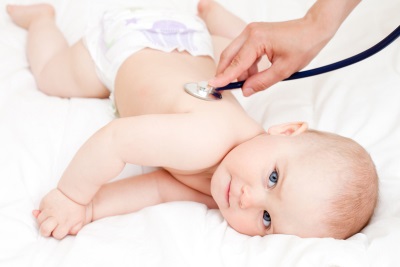
Tips
- Take a clean diaper with you for vaccination. We also recommend grabbing a toy that can distract the toddler from unpleasant sensations.
- Buy some antipyretic drugs to be prepared for a temperature response to vaccination.
- A few days before vaccination, as well as after it should not change the diet of the baby.
